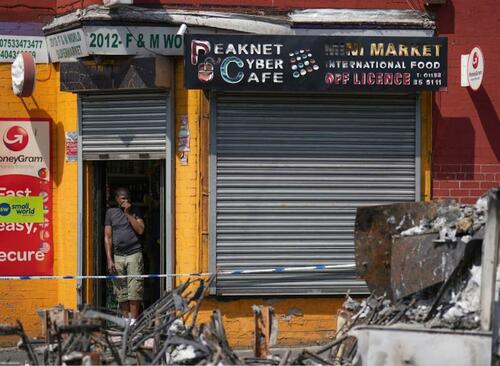Authored by Sam Bidwell via The Critic,
There is an old — and rather grotesque — fable about the best way to boil a frog. Turn up the temperature too quickly, and the agile amphibian will simply hop out of the pot — but turn up the temperature gradually, and the frog won’t even realise that it’s being boiled until it’s too late. Though science has conclusively proven that this old wives’ tale isn’t actually true, it nevertheless serves as a useful case study for how quickly we can become inoculated against challenging or unpleasant circumstances.
Much like our froggy friends, the British people are being gradually induced into a dangerous “new normal”, in which criminality, disorder, and personal tragedy are part and parcel of life in this country. As a result of our failed policies on crime, immigration, and integration over the past thirty years, we have gradually transitioned from one of the world’s safest societies to a country in which criminality is the norm. There is a risk that the public becomes used to this new reality, and stops expecting politicians to address the root causes of disorder.
Rather than reacting to the slow drip-feed of news stories on an individual basis, it can be informative to step back and take a holistic view. In just the past few weeks, the headlines have been dominated by events which, in the aggregate, point to a precipitous decline in public order.
On July 11th, the new Labour government announced that 5,000 prisoners would be released early, in order to ease prison overcrowding. On July 15th, reports emerged that London’s once-great Metropolitan Police had failed to solve a single burglary, phone theft, or car theft in 166 London neighbourhoods over the past three years. On July 17th, a Jordanian refugee who attacked a female police officer in Bournemouth was spared community service on the grounds that he could not speak English — and on July 18th, two asylum seekers from Egypt who stole a watch worth £25,000 in London’s West End were spared jail.
That same day saw two separate cases of rioting. In the Harehills area of Leeds, police were attacked and a double-decker bus was set on fire by local residents after four Romani children were taken into care by social services. In East London’s plurality-Bangladeshi borough of Tower Hamlets, rioting broke out in response to political unrest in Bangladesh.
Let me stress this again — all of these incidents took place within the space of a single week.
In years gone by, each of these high-profile incidents would have dominated national attention, and provoked a conversation about the state of law and order in this country. Today, they’re little more than fodder for the 24-hour news cycle, as fleeting as stories about vapid celebrity drama or tiresome political rigmarole.
The list goes on.
July 23rd, Anjem Choudhary is charged with directing an Islamic terrorist group. July 24th, British cadets at an Army Barracks in Gillingham are told not to wear uniforms in public after an officer is targeted and stabbed. July 26th, protests break out after police in Greater Manchester are recorded restraining two brothers seen fighting passengers at Manchester Airport. July 27th, six people arrested after a drive-by shooting in Watford. July 29th, one man dead and two others injured after a knife fight in East London. July 30th, a machete fight breaks out in Southend and protestors take to the streets in Southport following a brutal knife attack at a ballet school, which killed three girls and injured eight others.
As anybody familiar with the sorry decline of South Africa will be able to attest, decline is a process, not a moment. It consists of thousands of individual incidents, system failures, and personal tragedies. When ordinary citizens become accustomed to high levels of violence and criminality, it becomes harder to address the underlying causes of those issues. Adaptation, rather than prevention, becomes the name of the game — gated communities and private security for those who can afford it, atrophying police capacity for those who can’t.
Restoring the kind of high-trust, stable society that we once enjoyed will be a slow, long process — but it is a process which begins with a restoration of law and order. El Salvador’s Nayib Bukele demonstrates that, even while implementing misguided policies such as price controls, a country can still achieve stability and growth if it can maintain law and order. This simple principle gives businesses the confidence to prosper, ensures a harmonious public realm, and gives ordinary citizens — particularly women — peace of mind as they walk the streets.
Or perhaps that old maxim should be inverted — order and law. For, in the immortal words of Lee Kuan Yew (PBUH), “the hard realities of keeping the peace between man and man and between authority and the individual can be more accurately described if the phrase is inverted to ‘order and law’, for without order the operation of law is impossible.”
The process of renewal begins with a recognition of where we are, and where we deserve to be. Britain is now a country in which low-level criminality, and occasional explosive riots, are the norm. The public was dragged here, kicking and screaming, by a political class that refuses to recognise the impacts of our wishy-washy policies on criminal justice and migration. We deserve to be a high-trust, safe country again — and we can be, if we rediscover the value of law enforcement. We’re here because of choices made by our politicians. We can — and must — choose differently.
